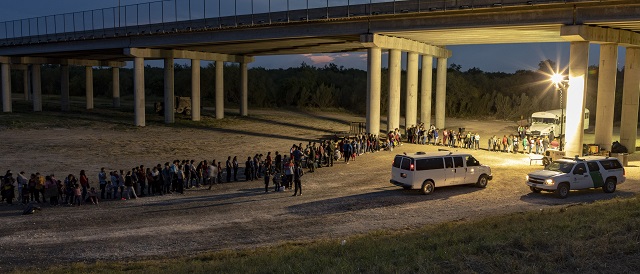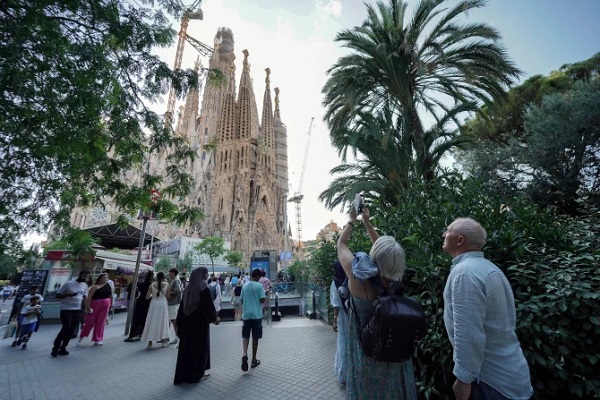Crime
Here’s How A Venezuelan Gang Was Able To Infiltrate The US And Wreak Havoc In Major Cities

From the Daily Caller News Foundation
A notorious Venezuelan gang is extending its tentacles into the U.S. on the back of the Biden-Harris administration’s border crisis, and experts say that immigration authorities have no way of identifying the criminal group’s members before they hit American soil.
The gang, known as Tren de Aragua, has made headlines in recent weeks with its criminal activities in multiple states, according to multiple reports. Yet, border authorities have virtually zero tools to detect Venezuelan migrants’ affiliations with the gang, as the U.S.’ diplomatic relationship with the beleaguered country is effectively on ice, experts told the Daily Caller News Foundation.
“We have next to no vetting for the Venezuelans who are entering the country, because we have no relationship with the government of Venezuela and that’s true of other migrant nationalities,” Jessica Vaughan, director of policy studies at the Center for Immigration Studies, told the DCNF. “We have no way of knowing whether they were in prison in Venezuela. We have no idea if they’ve been living in a third-world country for years before they tried to come to the United States. We’re essentially letting them in on their word.”
A hotel in El Paso, Texas, was shut down on Sept. 9 following an investigation into Tren de Aragua and other gangs’ use of the complex where alleged incidents of drug use and prostitution occurred, according to the El Paso Times. Additionally, the Dallas Police Department confirmed to the DCNF that there is an ongoing investigation into the gang’s activities in the area.
“We’re really not seeing Tren de Aragua operate in McAllen or Del Rio, or anything else like that,” Ammon Blair, former Customs and Border Patrol (CBP) agent and senior fellow at the Texas Public Policy Foundation, told the DCNF. “But they are operating in El Paso, because it’s a major city … there’s a large diaspora of Venezuelans there.”
In Aurora, Colorado, 10 Tren de Aragua members were identified by police on Sept. 11 as part of an investigation into a string of alleged criminal incidents at apartment complexes in the city, according to FOX 31. The alleged crimes include felony menacing, assault, motor vehicle theft and numerous shootings.
The property management company overseeing the complexes said the gang had effectively “taken over” the buildings, according to The Denver Post.
Tren de Aragua’s nefarious presence has even managed to draw the gaze of the Biden Treasury Department, which declared the gang a transnational criminal organization and announced sanctions in July, citing its involvement in human trafficking, drug trafficking and money laundering. Tren de Aragua started as a prison gang in the Venezuelan state of Aragua in 2013, taking over the Torocon prison and making it their base of operations, growing to around 5,000 members in 2023, according to Insight Crime.
Unlike other gangs, Tren de Aragua doesn’t have a defined set of tattoos that would make it easy for law enforcement to identify members, according to the El Paso Times. The gang’s main target is Venezuelan migrants, who they extort, smuggle and sex traffic to other countries, including the U.S., according to Insight Crime.
In order for CBP to get criminal records from Venezuelans, they would have to use Interpol data, as the U.S. doesn’t have a memorandum of agreement with Venezuela to exchange criminal records, Blair told the DCNF. Moreover, CBP often has to release the detainee before they can obtain criminal records from Interpol.
“Once Biden came into office and offered catch and release policies, temporary protected status, you name it, the Venezuelans started fleeing to the U.S. from all the other countries as well,” Blair told the DCNF. “So when we receive a lot of Venezuelans at the border, we’ll see that many Venezuelans have multiple identification cards from multiple countries, and so it’s very difficult to ascertain who they are.”
From fiscal year 2021 to 2023, CBP saw a 421% increase in Venezuelans encountered at the southern border, according to CBP data.
CBP told the DCNF that the agency has enhanced measures to screen for gangs, and any person deemed a threat is referred for prosecution or investigation as required. It also cited the Biden administration’s initiatives to curtail illegal immigration from the southern border, saying that the majority of southern border encounters in the last three fiscal years have resulted in a removal, return or expulsion.
“They’re now going to be in every diaspora of Venezuelans or Venezuelan communities inside the United States,” Blair added. “And now that we’ve imported over half a million Venezuelans since Biden’s been in office, they’re going to be in every one of those communities.”
Republican Texas Gov. Greg Abbott announced Monday he would designate Tren de Aragua a terrorist organization and bring the “full weight of the government” on the gang, according to The Texas Tribune. The gang has been active in the state since 2021, and more than 3,000 illegal immigrants from Venezuela have been arrested since then, according to Abbott.
“When it comes to migration from South America and Venezuela, I think that’s somewhere where they have a comparative advantage that they’ve taken advantage of,” Zack Smith, senior legal fellow at the Heritage Foundation told the DCNF. “And then I think also, in that same way, drug trafficking seems to be something that they’re able to tap into as well.”
In 2023, the Department of Homeland Security Investigations (HSI) partnered with Peru to create a “Transnational Crime Investigation Unit” to combat Tren de Aragua, according to Dialogo Americas. Peru is one of the many South American countries involved in the gang’s network for trafficking people and drugs.
“We’re not heavily scrutinizing anyone coming in,” Blair told the DCNF. “We’re not detaining them. We’re using alternatives to detention, so no one’s really being vetted.”
A U.S. Department of State spokesperson told the DCNF that the agency is working to contain the threat from the gang nationwide, citing efforts from the Biden administration to curtail illegal border crossings. The agency also said they partner with the Department of Homeland Security and the Department of Justice to disrupt the gang’s activity abroad and have improved their vetting tools.
The El Paso Police Department did not respond to the DCNF’s requests for comment.
Featured Image: Mani Albrecht U.S. Customs and Border Protection Office of Public Affairs Visual Communications Division
Crime
Public Execution of Anti-Cartel Mayor in Michoacán Prompts U.S. Offer to Intervene Against Cartels

“I don’t want to be just another mayor on the list of those executed”
On the first night of November, during Day of the Dead celebrations, the independent, anti-cartel mayor of Uruapan in Michoacán, Carlos Manzo, was assassinated in the heart of his city during a public festival. His bloody murder has underscored the deadly risks faced by local officials who may lack adequate protection from a state that critics say is corroded by corruption and penetrated by powerful cartel networks that, in some regions, have supplanted government authority. The killing intensifies urgent questions about political and police corruption, cartel impunity, and the scope of U.S.–Mexico security cooperation — with a response from the U.S. State Department today offering to “deepen security cooperation with Mexico.”
Manzo, a fiercely outspoken anti-cartel mayor who took office in 2024 as Uruapan’s first independent leader, was gunned down as he stood before crowds at the annual Day of the Dead candlelight celebration. Witnesses said gunfire erupted shortly after Manzo appeared onstage, holding his young son moments before the attack. The festival, known locally as the Festival de las Velas, drew hundreds of families to Uruapan’s central plaza — now transformed into the scene of Mexico’s latest high-profile political assassination, and a catalyst for nationwide outrage, as online protests surged and citizens called for demonstrations against cartel violence.
According to early reports, at least two suspects have been detained and one attacker was killed on site. Authorities asserted — despite the success of the attack — that Manzo had been under National Guard protection since December 2024, with additional reinforcements added in May 2025 following credible threats to his life.
In Washington today, the killing drew political reaction. “My thoughts are with the family and friends of Carlos Manzo, mayor of Uruapan, Michoacán, Mexico, who was assassinated at a public Day of the Dead celebration last night. The United States stands ready to deepen security cooperation with Mexico to wipe out organized crime on both sides of the border,” Deputy Secretary of State Christopher Landau, the former U.S. ambassador to Mexico, said in a statement shared online.
Federal Security Minister Omar García Harfuch said the gunmen “took advantage of the vulnerability of a public event” to carry out the attack, despite a standing security perimeter.
President Claudia Sheinbaum condemned the killing as a “vile” assault on democracy and vowed there would be “zero impunity.” Her administration convened an emergency security meeting and pledged that the investigation would reach the “intellectual authors” of the crime. Yet the murder has already ignited outrage across Mexico over the government’s failure to protect local officials in cartel-dominated states such as Michoacán, where extortion, assassinations, and territorial disputes continue to erode basic governance.
Manzo had publicly warned of his fate. “I don’t want to be just another mayor on the list of those executed,” he said earlier this year, as he pressed the federal government for better coordination between municipal and military authorities. For years, Uruapan — an agricultural and trade hub in western Mexico — has been the site of deadly clashes between the Jalisco New Generation Cartel and remnants of the Knights Templar Organization, both vying to control lucrative extortion and drug routes.
The killing of Manzo fits a dark and familiar pattern. In 2025 alone, several mayors in Michoacán, Guerrero, and Tamaulipas have been killed in attacks widely attributed to organized-crime groups. In June, the mayors of Tepalcatepec and Tacámbaro were ambushed and slain while traveling in official convoys. More than 90 local officials have been murdered since 2018 — a rate that analysts say reflects how cartels target municipal governments to ensure political control over territories tied to narcotics, mining, and agriculture. Uruapan, at the heart of Mexico’s avocado belt, is a strategic prize for the cartels that tax every shipment leaving the region.
The mayor’s death also recalls earlier tragedies that scarred the nation. In 2012, Dr. María Santos Gorrostieta Salazar, the former mayor of Tiquicheo, was abducted and murdered after surviving two assassination attempts and defying cartel threats. Her death became emblematic of the dangers faced by reformers who refuse to cooperate with criminal groups. More than a decade later, Manzo’s murder illustrates that little has changed — except the brazenness of the attackers, now willing to strike in front of cameras and families celebrating one of Mexico’s most sacred holidays.
The killing has also reignited long-standing U.S. frustration over Mexico’s inability to stem cartel violence, even as the Trump administration has expanded counter-narcotics operations at the border. Under Trump’s renewed directives, the U.S. has classified several Mexican cartels as foreign terrorist organizations and empowered the Pentagon to develop strike options against high-value targets abroad. A September 2025 joint statement between Washington and Mexico City pledged deeper intelligence sharing and cross-border enforcement initiatives, including efforts to halt arms trafficking southward.
However, Mexico’s government remains deeply wary of any U.S. military involvement on its soil. President Sheinbaum has warned that “Mexico will not stand for an invasion in the name of counter-cartel operations,” rebuffing Republican calls for unilateral action. Her position lays bare a long-standing tension between Mexico’s need for U.S. support and its insistence on sovereignty — a fault line that Manzo’s killing has reignited.
The Bureau is a reader-supported publication.
To receive new posts and support my work, consider becoming a free or paid subscriber.
Crime
Canada Seizes 4,300 Litres of Chinese Drug Precursors Amid Trump’s Tariff Pressure Over Fentanyl Flows

In what appears to be the second-largest Chinese precursor-chemical seizure in British Columbia in the past decade, Canadian border and police officials announced they intercepted more than 4,300 litres of chemicals used to manufacture fentanyl and other synthetic drugs at a notoriously troubled port in Delta, B.C.
The announcement of a seizure that occurred in May 2025 comes amid President Donald Trump’s continuing pressure on Ottawa to crack down on fentanyl trafficking in the province — which U.S. officials say has become a key production and shipment point for Chinese and Mexican traffickers.
The seizure — announced jointly by the Canada Border Services Agency (CBSA) and the RCMP — underscores the scale and persistence of global trafficking networks funnelling illicit materials into Canada’s drug markets.
According to the agencies, border officers examined two marine containers that arrived from China in mid-May, both bound for Calgary, Alberta. Acting on intelligence developed by CBSA’s Pacific Region, officers discovered 3,600 litres of 1,4 Butanediol, a key ingredient for producing GHB, often known as the “date-rape drug”; 500 litres of Propionyl Chloride, a chemical precursor used to synthesize fentanyl; and 200 litres of Gamma Butyrolactone (GBL), another controlled intoxicant.
The chemicals were concealed inside 60 clear jugs and 20 blue drums within the containers. Investigators believe the shipment was intended for use in clandestine drug laboratories. The RCMP confirmed that an investigation into the importation network remains ongoing.
The seizure comes amid growing concern about Canada’s port security, particularly in Metro Vancouver, where experts and local officials say criminal networks are exploiting gaps in federal enforcement.
The Delta seizure follows a series of major CBSA operations targeting precursor chemicals at Pacific ports. In May 2022, CBSA officers in the Metro Vancouver District examined a container from China declared as “toys” and discovered 1,133 kilograms of the fentanyl-precursor chemical Propionyl Chloride, with the potential to produce more than a billion doses of fentanyl.
Public Safety Canada also reported that in the first half of 2021, CBSA seized more than 5,000 kilograms of precursor chemicals, compared with just 512 kilograms in 2020 — reflecting what officials called a “dramatic escalation” in attempts to smuggle fentanyl inputs into the country.
In 2023, the City of Delta released a report highlighting major vulnerabilities at port terminal facilities, warning that there is “literally no downside” for organized criminals to infiltrate port operations. The report noted that British Columbia’s provincial threat assessment rated ports as highly susceptible to corruption and organized-crime infiltration.
At the time, Delta Mayor George Harvie called the lack of a dedicated national port-policing force “a threat to national security.” In comments to the Canadian Press, Harvie said that while Canada’s ports fall under federal jurisdiction, the “total absence of uniformed police at the facilities makes them obvious targets for criminal elements — from Mexican drug cartels to biker gangs.”
“We’re witnessing a relentless flow of illegal drugs, weapons and contraband into Canada through our ports, and that threatens our national security,” Harvie said.
The Port of Vancouver complex, which includes major terminals in Delta, Surrey, and Vancouver, handles roughly three million containers annually, with millions more expected as port expansion plans move forward.
The Delta report reiterated how difficult it has become to police these sprawling operations since the Ports Canada Police were disbanded in 1997. More than a quarter-century later, Harvie said, the consequences of that decision are now “alarmingly clear.”
The CBSA announcement today comes as U.S. President Donald Trump has imposed tariffs on Canadian exports, accusing Ottawa of failing to interdict the flow of fentanyl and precursor chemicals trafficked through British Columbia ports. Washington has repeatedly pressed Canada to strengthen port enforcement and anti-money-laundering controls, citing the West Coast’s role in China- and Mexico-linked trafficking networks.
Simultaneously, in trade negotiations with Beijing, Mr. Trump announced a reduction in tariffs tied to the fentanyl supply chain — raising concern that Washington has eased pressure on China, the primary source of finished fentanyl now responsible for hundreds of thousands of overdose deaths across North America.
Subscribe for free to receive new posts and support my work.
For the full experience, please upgrade your subscription and support a public interest startup.
We break international stories and this requires elite expertise, time and legal costs.
-

 International2 days ago
International2 days agoSagrada Familia Basilica in Barcelona is now tallest church in the world
-

 Alberta2 days ago
Alberta2 days agoGondek’s exit as mayor marks a turning point for Calgary
-

 Agriculture2 days ago
Agriculture2 days agoCloned foods are coming to a grocer near you
-

 Business19 hours ago
Business19 hours agoYou Won’t Believe What Canada’s Embassy in Brazil Has Been Up To
-

 Censorship Industrial Complex19 hours ago
Censorship Industrial Complex19 hours agoSenate Grills Meta and Google Over Biden Administration’s Role in COVID-Era Content Censorship
-

 Fraser Institute2 days ago
Fraser Institute2 days agoOttawa continues to infringe in areas of provincial jurisdiction
-

 Business18 hours ago
Business18 hours agoMystery cloaks Doug Ford’s funding of media through Ontario advertising subsidy
-

 Crime6 hours ago
Crime6 hours agoPublic Execution of Anti-Cartel Mayor in Michoacán Prompts U.S. Offer to Intervene Against Cartels














